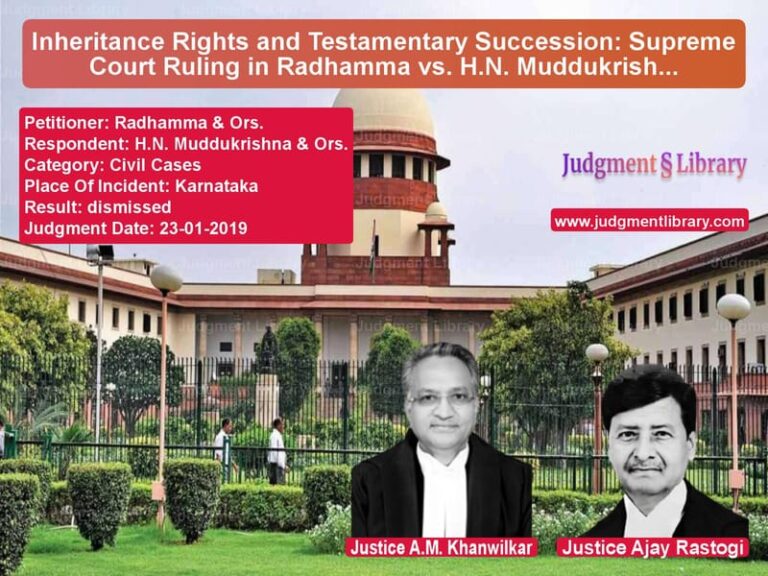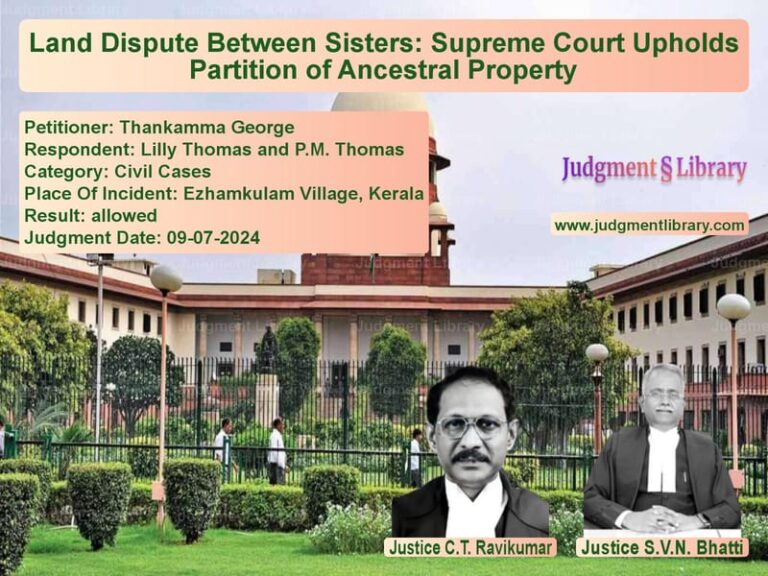Criminal Conspiracy and Murder: Supreme Court Upholds Conviction in Coimbatore Case
The Supreme Court of India recently ruled on a significant case involving criminal conspiracy and murder in Bilal Hajar @ Abdul Hameed vs. State Rep. by the Inspector of Police. The case, originating from Coimbatore, involved a criminal conspiracy leading to the murder of one Siva Kumar @ Siva. The appellant, Bilal Hajar, was convicted under Section 120-B of the Indian Penal Code (IPC) and sentenced to life imprisonment. His appeal was dismissed by both the High Court of Madras and the Supreme Court, reaffirming the principle that conspirators are equally culpable as the actual perpetrators of a crime.
The trial court had sentenced multiple accused under Sections 120-B, 148, 302, and 332 IPC, sentencing them to life imprisonment. The High Court upheld the conviction except for one accused who was acquitted. The Supreme Court examined whether the evidence sufficiently established the appellant’s involvement in the conspiracy and upheld the judgment.
Background of the Case
The case traces back to August 19, 1991, when posters were found in Coimbatore containing threats against seven individuals, including the deceased, Siva Kumar. Following these threats, Siva verbally abused members of a particular community in a public meeting. This led to a conspiracy being hatched on September 1, 1991, at the house of the appellant, Bilal Hajar, where the accused agreed to kill Siva within ten days.
Prosecution’s Case
On September 5, 1991, five of the accused, armed with weapons, attacked Siva on Kovai Mill Road, Coimbatore. Accused A-1 and A-3 stabbed Siva fatally, and a police constable who intervened was also injured. Siva was rushed to a hospital but succumbed to his injuries.
Trial Court’s Findings
The Additional Sessions Court, Fast Track No.111, Coimbatore, convicted the accused under:
- Section 120-B IPC (criminal conspiracy)
- Section 302 IPC (murder)
- Section 332 IPC (voluntarily causing hurt to deter a public servant from duty)
The appellant, Bilal Hajar, was convicted solely under Section 120-B IPC and sentenced to life imprisonment.
Appeal Before the High Court
The convicted individuals appealed to the High Court of Madras, which upheld the convictions except for one accused (A-9), who was acquitted. The conviction of another accused under Section 120-B IPC was set aside, but the appellant’s conviction remained.
Supreme Court’s Ruling
The Supreme Court, through Justices Abhay Manohar Sapre and Indu Malhotra, upheld the High Court’s ruling, emphasizing the importance of the doctrine of criminal conspiracy.
“It is well settled that a criminal conspiracy is always hatched in secrecy and is never an open affair. Its existence has to be gathered on the basis of circumstantial evidence, such as the conduct of the conspirators and the chain of events leading to the crime.”
The Court relied on the testimonies of two witnesses (PW-3 and PW-4), who saw the meeting on September 1, 1991, where the plan to kill Siva was discussed.
Key Arguments
Defense Arguments
- The appellant argued that his conviction was based solely on the testimonies of PW-3 and PW-4, whom he labeled as chance witnesses.
- His counsel pointed out inconsistencies in their statements and claimed that the appellant was not present at the crime scene on September 5, 1991.
- He contended that there was no direct evidence linking him to the conspiracy.
Prosecution’s Stand
- The prosecution established that the meeting took place at the appellant’s house, where the plan to murder Siva was hatched.
- Testimonies of PW-3 and PW-4 were corroborated by other evidence, proving the appellant’s involvement.
- Though he was not physically present at the crime scene, he was the key conspirator, making him equally responsible under Section 120-B IPC.
Legal Interpretation and Precedents
The Court referred to its previous judgments, including Major E.G. Barsay vs. State of Bombay (1962), stating:
“The gist of the offence of criminal conspiracy is the agreement to break the law. Once such an agreement is proved, all conspirators are liable regardless of whether they committed the act themselves.”
Conclusion
The Supreme Court concluded that the prosecution had proved beyond reasonable doubt that the appellant was a conspirator. The appeal was dismissed, affirming the life sentence imposed on him.
Impact of the Judgment
- This ruling reaffirms the principle that a person involved in a criminal conspiracy is equally culpable, even if they did not commit the final act.
- It highlights the role of circumstantial evidence in proving conspiracy cases.
- The judgment strengthens the legal framework in cases involving organized crimes and conspiracies.
The case serves as a crucial precedent in Indian criminal law regarding conspiracy and collective responsibility in criminal acts.
Petitioner Name: Bilal Hajar @ Abdul Hameed.Respondent Name: State Rep. by the Inspector of Police.Judgment By: Justice Abhay Manohar Sapre, Justice Indu Malhotra.Place Of Incident: Coimbatore.Judgment Date: 10-10-2018.
Don’t miss out on the full details! Download the complete judgment in PDF format below and gain valuable insights instantly!
Download Judgment: Bilal Hajar @ Abdul vs State Rep. by the In Supreme Court of India Judgment Dated 10-10-2018.pdf
Direct Downlaod Judgment: Direct downlaod this Judgment
See all petitions in Criminal Conspiracy
See all petitions in Murder Cases
See all petitions in Attempt to Murder Cases
See all petitions in Judgment by Abhay Manohar Sapre
See all petitions in Judgment by Indu Malhotra
See all petitions in dismissed
See all petitions in supreme court of India judgments October 2018
See all petitions in 2018 judgments
See all posts in Criminal Cases Category
See all allowed petitions in Criminal Cases Category
See all Dismissed petitions in Criminal Cases Category
See all partially allowed petitions in Criminal Cases Category







